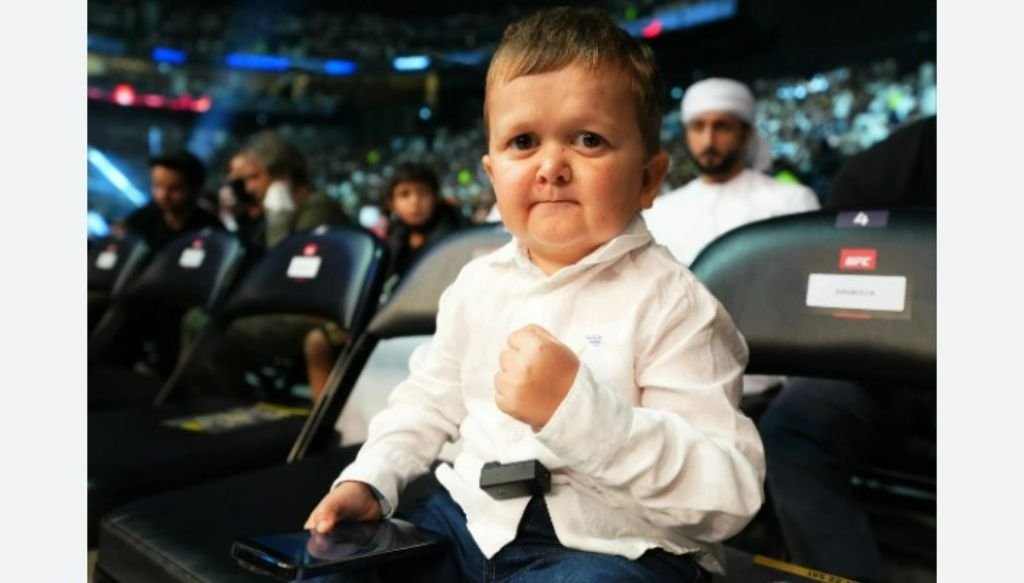Whats wrong with Hasbulla? Many people have been questioning his unique appearance and health.
Hasbulla, the 20-year-old internet sensation, has sparked concerns about his health due to his unique features. Many have wondered why he looks so youthful, and it turns out he suffers from a rare genetic disorder called Growth Hormone deficiency.
This condition, which can cause delayed puberty and short stature in children, as well as muscle fatigue and reduced exercise capacity in adults, can be successfully treated with Human Growth Hormone injections.
Also read: Meet Brad Cox Wife Livia Frazar – Sons And Family
What Is Wrong With Hasbulla?
Hasbulla’s youthful appearance, despite being 20 years old, has raised questions about his health and the reasons behind his unique features. As it turns out, Hasbulla and his rival Abdu Rozik suffer from Growth Hormone deficiency.
This rare genetic disorder is caused by the pituitary gland’s inability to produce enough Growth Hormone (GH), essential for average growth and development. Dr. Karan Raj, a medical expert on TikTok, has helped to shed light on this condition.

He explains that, in some cases, Growth Hormone deficiency can result from tumors affecting the pituitary gland. Still, in many instances, doctors cannot pinpoint the exact cause of the disorder.
This seems to be the case with Hasbulla, as no known underlying issues have been identified to explain his condition.
Hasbulla Disorder And Disease
As mentioned, Hasbulla has Growth Hormone deficiency. It is a rare condition that affects both children and adults. It can lead to short stature, delayed puberty, and various other developmental issues in children.
The deficiency can cause muscle fatigue and a reduced capacity for exercise in adults. The good news is that if Growth Hormone deficiency is diagnosed early, it can often be successfully treated using Human Growth Hormone injections.
These injections stimulate growth and development during puberty, helping affected individuals achieve a more typical height and build. A famous example of successful HGH treatment is Argentine soccer star, Lionel Messi.

Diagnosed with Growth Hormone deficiency at age 10, Messi underwent HGH treatment, funded by Barcelona, when he joined their academy a few years later.
Also read: Is Aljamain Sterling Black? Ethnicity And Nationality
Today, Messi is considered one of the greatest soccer players of all time, proving that with the proper treatment and support, individuals with Growth Hormone deficiency can overcome their condition and achieve great things.
While HGH injections can benefit many people with Growth Hormone deficiency, they may not suit everyone. The treatment’s effectiveness depends on the severity of the deficiency and the individual’s responsiveness to HGH.
It is essential for those considering HGH injections to consult with a medical professional to determine if the treatment is appropriate and safe for their specific situation.
Furthermore, HGH injections are not without potential side effects. Due to the treatment, some individuals may experience joint pain, fluid retention, and carpal tunnel syndrome.
In rare cases, HGH injections can cause more severe complications, such as diabetes or high blood pressure. It is vital for individuals receiving HGH treatment to be closely monitored by their healthcare provider to ensure their safety and well-being.
In conclusion, Hasbulla’s unique appearance and high-pitched voice may have brought him internet fame. Still, they also serve as a reminder of the challenges faced by those with Growth Hormone deficiency.
While treatments like HGH injections can offer hope to many individuals with this disorder, it is crucial to remember that each person’s journey is different, and the effectiveness of treatments can vary.
As with any medical condition, early diagnosis and intervention are crucial to improving outcomes for those with Growth Hormone deficiency.

